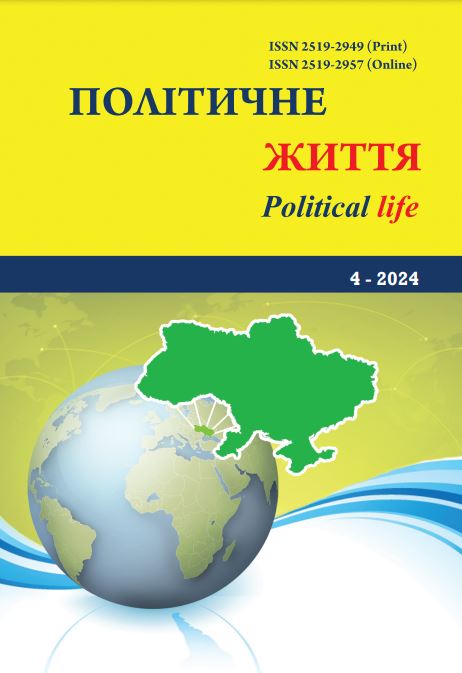Conceptual models of trilateral energy diplomacy
DOI:
https://doi.org/10.31558/2519-2949.2024.4.10Keywords:
energy security, energy diplomacy, energy crisis, energy imports, energy policy, national securityAbstract
The paper analyses conceptual models of trilateral energy diplomacy. It is determined that energy security issues have recently become more acute in the countries of the Global North. Supply chain problems and protectionist policies have brought the energy crisis to the fore during the COVID-19 pandemic, which was exacerbated by the subsequent Russian invasion of Ukraine in 2022. Energy security – the continuous availability of energy in different forms, in sufficient quantities and at affordable prices – has many dimensions. It means limited vulnerability to temporary or prolonged disruptions in the supply of imported energy. It also means the availability of local and imported resources to meet, over time and at reasonable prices, growing energy demand. Environmental challenges, liberalisation and deregulation, and the increasing dominance of market forces have profound implications for energy security. Energy security needs to be examined at several levels: global, to ensure resource adequacy; regional, to enable networking and trade; country level, to ensure national security of supply; and consumer level, to ensure that consumer demand is met. It is noted that the competitive and cooperative partner country models with their trilateral diplomacy models better describe the specifics of traditional European energy security policy than the positive state model. Similarly, two alternative country models can better illustrate the equilibrium resulting from the breakdown of the original system and the different types of political interactions embedded in the new institutional, ideological and market-based environment of EU energy security than the regulatory country. These models are the supplier country and the catalyst country. The supplier country is based on a market-based approach to energy policy, assigns a limited role to state intervention and is characterised by multilateral models of energy diplomacy. A catalyst country, on the other hand, emphasises a combination of market instruments with more direct and specific forms of state intervention. It also emphasises the active role of state agents as strategic decision makers in a liberalised market structure and their extensive participation in the network model of energy diplomacy.
References
The politics of energy security.URL: https://www.nature.com/articles/s41560-023-01398-2 (dated from: 06.10.2024).
Components of Energy Security. URL: https://safetyculture.com/topics/energy-security/ (dated from: 06.10.2024).
Khatib H. Chapter 4. Energy security. URL: https://www.undp.org/sites/g/files/zskgke326/files/publications/chapter4.pdf (dated from: 06.10.2024).
Stopford J., Strange S. Rival States, Rival Firms: Competition for World Market Shares. Cambridge: Cambridge University Press, 1991.
Hayes M. H., Victor D. G. Politics, Markets, and the Shift to Gas: Insights, 2006.
Seven Historical Case Studies in Victor D. G., Jaffe A. M., Hayes, M. H. (eds.), Natural Gas and Geopolitics: From 1970 to 2040, Р. 319–353. Cambridge: Cambridge University Press.
Goldthau A. Energy Diplomacy in Trade and Investment of Oil and Gas, in Goldthau, A., Witte, J. M. (eds.), Global Energy Governance: The New Rules of the Game, pp. 25–47. Washington, DC: Brooking Institution Press, 2010.
Goldthau A. From the State to the Market and Back: Policy Implications of Changing Energy Paradigms. Global Policy. 2012. № 3 (2). P. 198–210.
Boussena S., Locatelli, C. 2013. Energy Institutional and Organisational Changes in EU and Russia: Revisiting Gas Relations. Energy Policy. 2013. № 55. Р. 180–189.
Talus K. European Union Energy: New Role for States and Markets, in Belyi, A., Talus, K. (eds.), States and Markets in Hydrocarbon Sectors, Р. 198–213. Basingstoke: Palgrave Macmillan, 2015.
Goldthau A., Sitter N. A Liberal Actor in a Realist World: The European Union Regulatory State and the Global Political Economy of Energy. Oxford: Oxford University Press, 2015.
Caporaso J. The European Union and Forms of State: Westphalian, Regulatory or Post-Modern? Journal of Common Market Studies. 2006. № 34 (1). P. 29–52.
Youngs R. Energy Security: Europe’s New Foreign Policy Challenge. London: Routledge, 2009.
Colli A., Mariotti S., Piscitello L. 2014. Governments as Strategists in Designing Global Players: The Case of European Utilities. Journal of European Public Policy. 2009. № 21 (4). Р. 487–508.
Weiss L. The Myth of the Powerless State. Ithaca: Cornell University Press. 1998.
Pollitt M. G. New Models of Public Ownership in Energy, in Picot, A., Florio, M., Grove, N., Kranz, J. (eds.), The Economics of Infrastructure Provisioning: The Changing Role of the State, 2006. Р. 387–405.
Hocking B. Diplomacy in Carlsnaes W., Sjursen H., White B. (eds.), Contemporary European Foreign Policy, 2004. Р. 91–110.
Braun J. F. EU Energy Policy under the Treaty of Lisbon Rules: Between a New Policy and Business as Usual. CEPS/EPIN Working Paper 31, 2011.

